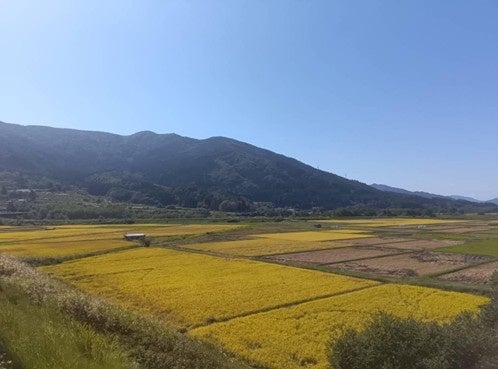Targeting an expansion of approximately 20,000 hectares of paddy fields and 5,000 dairy cows in the Tohoku area by 2026.
Green Carbon Inc. (CEO: Jun Okita; hereinafter “Green Carbon”), a company engaged in the development and sale of nature-based carbon credits, is pleased to announce the establishment of new Akita and Sendai Sales Offices to advance the creation of nature-based J-Credits. Taking this opportunity, Green Carbon is recruiting agricultural producers, forest owners, dairy farmers, and partner companies in the Tohoku area. The company aims to expand its coverage by 2026 to include approximately 20,000 hectares of paddy fields, which is equivalent to 5% of the total paddy field area in the Tohoku region (approx. 349,000 ha), and 5,000 dairy cows, which is equivalent to 6% of the total dairy cow population in the Tohoku region (approx. 89,300 head).
〇For inquiries regarding this press release and for further details, please contact:
〇To download Green Carbon Co., Ltd.’s company profile, please visit:
◆ Background on the Establishment of the Akita and Sendai Sales Offices
Green Carbon develops and supports nature-based carbon credit creation and sales, primarily in Japan and Southeast Asia. As part of Japan’s move toward decarbonization, the full-scale launch of the Emissions Trading Scheme (hereinafter: GX-ETS) is scheduled for the fiscal year 2026. Furthermore, on May 28, 2025, the revised GX Promotion Act was passed by the House of Representatives plenary session, which mandates emissions reporting and reduction obligations for businesses that emit 100,000 tons or more. This acceleration marks a quickening of Japan’s transition toward decarbonization.
The demand for J-Credits is also increasing, and J-Credit prices are soaring even within the Tokyo Stock Exchange’s carbon credit market. J-Credits derived from renewable energy and energy saving, which were relatively inexpensive from 2023 to 2024, are currently being traded at about 6,000 yen/ton for Renewable Energy and about 5,000 yen/ton for Energy Saving as of August 2025—prices that are roughly two to three times higher than the previous fiscal year.
The price difference between these credits and the paddy field credits provided by Green Carbon is narrowing. We anticipate that demand for credits from agricultural and forestry sectors, which contribute more directly to the natural environment, will increase.
Green Carbon began its nature-based J-Credit creation initiative in the 2023 fiscal year and has been collaborating with agricultural producers nationwide. The new establishment of the Akita and Sendai Sales Offices is rooted in the idea of building a foothold in the Tohoku region—an area with high potential for generating J-Credits from agriculture and forestry—in order to return profits and benefits to the agricultural and forestry producers in this area. With this expansion, Green Carbon plans to generate 100,000 tons of J-Credits from paddy fields, 15,000 tons from forestry, and 10,000 tons from dairy farming in 2026.This total of 125,000 tons amounts to 13% of the total annual volume of J-Credits created in Japan (approximately 1,000,000 tons).
◆ Potential of the Tohoku Area
●Regarding Paddy Field-Derived J-Credits
Tohoku area possesses 394,000 hectares of paddy fields, boasting the largest rice-paddy acreage in Japan. However, the region has recently faced persistent difficulties with unstable harvests due to factors such as high-temperature damage in 2023, heavy rain damage in 2024, and drought in 2025.
By establishing these new sales offices, Green Carbon will gain better access to each prefecture and be able to work more closely with local producers. Furthermore, we will expand initiatives that benefit producers by increasing their income through J-Credit creation. We aim to expand our coverage to approximately 20,000 hectares of paddy fields in the Tohoku region (equivalent to 5% of the total paddy field area of approximately 349,000 ha in Tohoku) by the end of FY2026.
●Regarding Forest-Derived J-Credits
Japan’s forest area occupies approximately 66% of the national land, reaching about 25.1 million hectares. This corresponds to roughly two-thirds of the country’s total land area. The Tohoku area, in particular, has a large proportion of land covered by forests (the forest area of the Tohoku region is approximately 3,720,000 ha), with the forest occupancy rate exceeding 70% in Iwate and Akita prefectures. Green Carbon aims to leverage the high CO2 absorption capacity of these Tohoku forests to create forest credits with the owners of private and national forests. We will promote the expansion of the Tohoku area in collaboration with our forest-derived J-Credit creation partners.
● Regarding Dairy Farming-Derived J-Credits
In Japan, approximately 15 million tons of greenhouse gases are emitted annually from the dairy and livestock sector. Among these, emissions from dairy and beef cattle account for about 80%, with dairy cows, in particular, emitting twice the amount of greenhouse gas per head as beef cattle. Therefore, in the Tohoku area, where approximately 89,300 dairy cows are raised, Green Carbon will utilize the methodology “Changes in Livestock Manure Management Methods (AG-002).” This methodology involves introducing forced fermentation equipment for livestock manure to increase the speed of fermentation, thereby reducing greenhouse gases generated during the fermentation process. The reduced emissions are then certified as J-Credits. This approach will contribute to the decarbonization efforts of dairy farmers and increase their income through the sale of J-Credits. Green Carbon aims to create credits equivalent to 5,000 dairy cows by the end of FY2026, which represents about 6% of the total dairy cow population in the Tohoku region (approximately 89,300 head).
Therefore, Green Carbon will contribute to decarbonization and save the planet by creating nature-based carbon credits in the Tohoku area based on the vision of “Save the earth with the power of nature. ”
◆ Overview of the Sales Offices
| Sales Office Name | Akita Sales Office (Jurisdiction: Aomori Prefecture, Akita Prefecture, Iwate Prefecture) |
| Office Manager | Keita Nakao |
| Contact Information | 070-1249-6340 / k.nakao@green-carbon.inc |
| Location Details | https://maps.app.goo.gl/GioL6nrrALCKPsTn7* Operating from a co-working space in Akita City |
| Sales Office Name | Sendai Sales Office (Jurisdiction: Yamagata Prefecture, Miyagi Prefecture, Fukushima Prefecture) |
| Office Manager | Keisuke Sato |
| Contact Information | 070-6637-0253 / k.sato@green-carbon.inc |
| Location Details | https://maps.app.goo.gl/Jb4Lre7Se1ZzKA8V6* Operating from a co-working space in Sendai City |


◆ Green Carbon Inc.
Representative: Jun Okita, CEO
Head Office: PREX North 9F, 2-3-2 Kojimachi, Chiyoda-ku, Tokyo, Japan
Established: December 2019
Business Activities: Development and sales of carbon credits, agriculture-related projects, environmental projects, other related businesses, and ESG consulting
Website: https://green-carbon.co.jp/en/
◆ About Green Carbon
Guided by the vision of “Harnessing the power of life to save the Earth,” Green Carbon develops and supports projects that generate, register, and sell nature-based carbon credits both in Japan and abroad. The company is also engaged in agriculture-related businesses, R&D initiatives, and ESG consulting.
Its business activities span Japan, Southeast Asia, Australia, and South America, creating credits from rice paddies, biochar, forest conservation, carbon farming, mangrove planting, and cattle methane reduction. In Japan, Green Carbon obtained certification in FY2023 for the country’s first and one of the largest-scale rice paddy J-Credit projects (approx. 6,220 t). In FY2024, the company plans to expand this initiative to around 40,000 ha (approx. 80,000 t).
Green Carbon also provides “Agreen,” a one-stop platform service that streamlines the entire process of credit registration, application, and sales. By simplifying procedures and documentation, the service reduces the administrative burden on credit creators.

